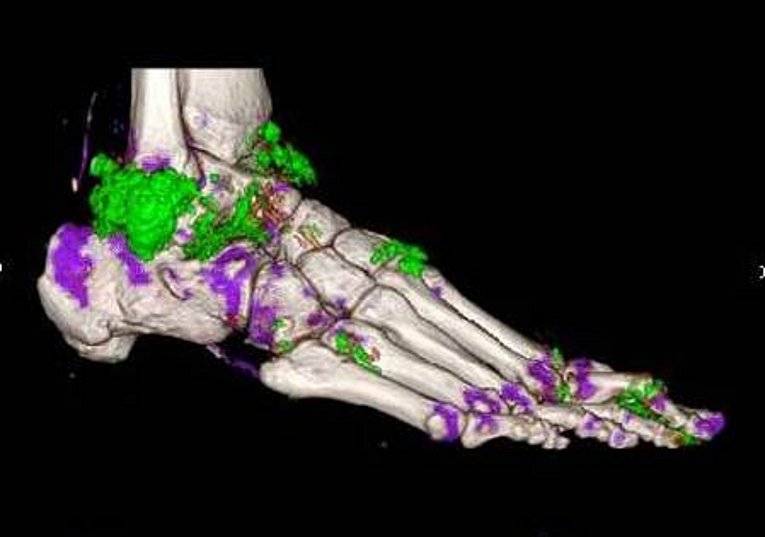What is gout?
Gout (uricopathy) is a metabolic disease in which uric acid accumulates in the body and is deposited in the form of needle-sharp crystals in joints and tissues. The immune system tries to fight these crystals. The result: a severe attack of pain which, thanks to a clever trick of the immune system, subsides after a few days, even if untreated. The cause is usually a genetic predisposition that causes the kidneys to excrete uric acid more poorly. But diseases (e.g. diabetes mellitus), medications as well as an unhealthy diet, lack of exercise and being overweight can also lead to a weakness in kidney function and trigger gout.
What are the typical symptoms?
Sudden severe pain in a joint or in the whole finger or toe, which subsides after a few hours up to 2 days. A gout attack often occurs in the base joints of the big toes, as well as the knee, ankle and wrist joints. The joints are also hot, red, swollen and painful when pressed. In addition, uric acid crystals can be detected in the joint fluid.
How do you recognise gout?
An elevated uric acid level is detected by examining the blood. A reliable way to detect the disease is joint puncture, in which joint fluid is taken and uric acid crystals are measured in it. Ultrasound or a special form of computer tomography, dual-energy CT, help to diagnose the disease and differentiate it from other rheumatic diseases.
What can be done about gout?
The treatment of gout has two goals:
- to relieve the pain in the acute stage and
- to reduce the inflammatory activity in the long term.
During the gout attack, anti-rheumatic, analgesic anti-inflammatory drugs such as diclofenac or glucocorticoids are used. In addition, temporary immobilisation of the joint helps. Afterwards, a drug therapy to lower the uric acid level is prescribed.
Tips for everyday life
Today, gout is almost always curable. The prerequisite is that the therapy and a balanced diet low in meat are adhered to.
Consultation hour for Rheumatology and Immunology
Special consultation hour
Mehul Lapsiwala
Panagiotis Garantziotis
Zeiten
Monday - Thursday
07.30--10.00 h and 14.00--15.30 h
Friday
07.30--11.00 h
Internistisches Zentrum
Erdgeschoss, Bauteil C
Ulmenweg 18
91054 Erlangen
Appointments only upon consultation
Use the patient app of UKER to schedule your appointment.
Alternative contact options:
Phone: +49 9131 85-34742
Fax: +49 9131 85-36448
or by e-mail to m3hsa(at)uk-erlangen.de
Hinweis
Due to the high volume of patients, initial appointments can only take place after telephone consultation between the referring colleagues and the clinic's duty physician.
Downloads
Required documents
- Certificate of Insurance (health insurance card)
- Allocation
- Copies of the preliminary findings
- X-ray images
- Reports from previous hospitalizations
- in case of initial appointment, completed questionnaire (see documents)




